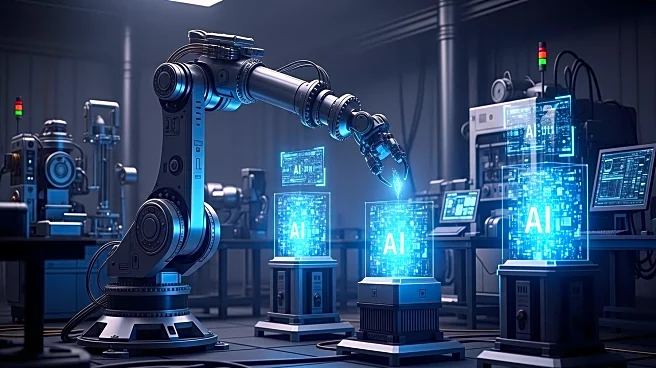What is the story about?
What's Happening?
A significant divergence is emerging in the U.S. economy as manufacturing struggles while artificial intelligence experiences a surge in investment. President Trump has emphasized the importance of both sectors, aiming to lead globally in AI and revitalize manufacturing. Despite efforts, manufacturing has lost 38,000 jobs this year, while AI investments have driven tech company valuations into trillions. The AI boom is supported by increased demand for microchips and data centers, but concerns persist about its long-term employment impact. Manufacturing, once a cornerstone of the U.S. economy, continues to face challenges despite tariff protections.
Why It's Important?
The contrasting fortunes of manufacturing and AI have broad implications for the U.S. economy. The AI sector's growth could lead to fewer blue-collar jobs, impacting traditional manufacturing employment. While AI investments promise technological advancements, they may not provide the same level of job creation as manufacturing. The slump in manufacturing affects economic stability, with fewer startups and decreased factory investments. The AI boom, if unsustainable, could pose risks to economic growth. Policymakers must balance support for AI innovation with measures to revitalize manufacturing and ensure economic security.
What's Next?
The U.S. government continues to invest in semiconductor production, with projects under construction. However, the long-term impact on job creation remains uncertain. The AI sector's growth may lead to further technological advancements, but its employment potential is limited. Manufacturing faces ongoing challenges, with tariff-related costs affecting profitability. Policymakers may need to reassess strategies to support both sectors, ensuring sustainable growth and job creation. The potential for an AI investment bubble could have cascading effects on the economy, necessitating careful monitoring and policy adjustments.
Beyond the Headlines
The AI boom raises ethical and economic questions about the future of work and technological dependency. As AI technologies advance, concerns about data privacy, security, and the displacement of traditional jobs grow. The manufacturing slump highlights the need for policies that support innovation while preserving employment opportunities. The balance between technological progress and economic stability is crucial for long-term growth. The divergence between AI and manufacturing underscores the complexity of modern economic challenges, requiring nuanced approaches to policy and investment.















